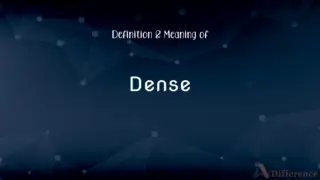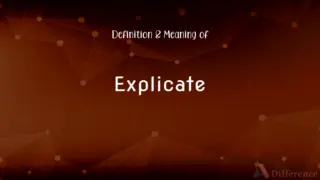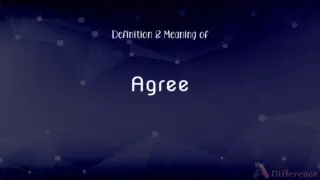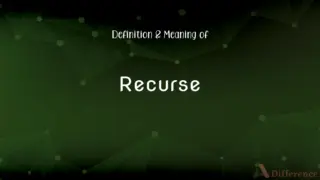Convey Definition and Meaning
By Tayyaba Rehman & Fiza Rafique — Updated on March 5, 2024
To convey means to communicate or make known thoughts, feelings, or information to someone. e.g., The teacher used examples to convey the concept clearly.

Table of Contents
Convey Definitions
Express Feelings: To communicate emotions or feelings.
Her smile conveyed her happiness.
Transmit Information: To pass information from one person to another.
Emails convey messages instantly across the globe.
Transport Goods: To carry or move goods from one place to another.
The conveyor belt conveys luggage to the airplane.
Transfer Ownership: To legally transfer property or rights to someone else.
The deed conveys ownership of the land.
Communicate Intent: To make intentions or plans known.
The memo conveyed the manager's plans for the project.
Impart Knowledge: To transfer knowledge or information.
The lecture conveyed important historical facts.
Represent Ideas: To symbolize or stand for ideas, concepts, or messages.
The flag conveys the country's values.
Relay Messages: To pass along messages from one person to another.
He conveyed the urgent message to the team.
Evoke Emotions: To bring about feelings or emotions in others.
The painting conveys a sense of calm.
Demonstrate Principles: To show or illustrate principles or theories through examples.
The experiment conveyed the principle of gravity.
To take or carry from one place to another; transport.
To serve as a medium of transmission for; transmit
Wires that convey electricity.
To communicate or make known; impart
"a look intended to convey sympathetic comprehension" (Saki).
(Law) To transfer ownership of or title to.
(Archaic) To steal.
To move (something) from one place to another.
Air conveys sound. Water is conveyed through the pipe.
(dated) To take or carry (someone) from one place to another.
To communicate; to make known; to portray.
To convey an impression; to convey information
(legal) To transfer legal rights (to).
He conveyed ownership of the company to his daughter.
(obsolete) To manage with privacy; to carry out.
(obsolete) To carry or take away secretly; to steal; to thieve.
To carry from one place to another; to bear or transport.
I will convey them by sea in floats.
Convey me to my bed, then to my grave.
To cause to pass from one place or person to another; to serve as a medium in carrying (anything) from one place or person to another; to transmit; as, air conveys sound; words convey ideas.
To transfer or deliver to another; to make over, as property; more strictly (Law), to transfer (real estate) or pass (a title to real estate) by a sealed writing.
The Earl of Desmond . . . secretly conveyed all his lands to feoffees in trust.
To impart or communicate; as, to convey an impression; to convey information.
Men fill one another's heads with noise and sound, but convey not thereby their thoughts.
To manage with privacy; to carry out.
I . . . will convey the business as I shall find means.
To carry or take away secretly; to steal; to thieve.
To accompany; to convoy.
To play the thief; to steal.
But as I am Crack, I will convey, crossbite, and cheat upon Simplicius.
Make known; pass on, of information
Serve as a means for expressing something;
The painting of Mary carries motherly love
His voice carried a lot af anger
Transfer to another;
Communicate a disease
Transmit a title or property
Transmit or serve as the medium for transmission;
Sound carries well over water
The airwaves carry the sound
Many metals conduct heat
Take something or somebody with oneself somewhere;
Bring me the box from the other room
Take these letters to the boss
This brings me to the main point
Go or come after and bring or take back;
Get me those books over there, please
Could you bring the wine?
The dog fetched the hat
Convey Snonyms
Transmit
To pass on from one place or person to another.
The disease is transmitted through direct contact.
Relay
To pass on (information or a message) to others.
The runner relayed the baton to his teammate.
Transport
To carry or move from one place to another.
The pipeline conveys water to the city.
Communicate
To share or exchange information, news, or ideas.
He communicated his findings to the committee.
Bear
To carry or bring along.
The messenger bore urgent news.
Impart
To make (information) known.
The teacher imparts knowledge to her students.
Deliver
To bring and hand over (a letter, parcel, or ordered goods) to the proper recipient or address.
He delivers the mail to our neighborhood.
Channel
To direct toward a particular end or object.
She channeled her energy into her art.
Express
To convey (a thought or feeling) in words or by gestures and conduct.
She expressed her gratitude to the hosts.
Dispatch
To send off to a destination or for a purpose.
The company dispatches orders within 24 hours.
Convey Idioms & Phrases
Convey across the miles
To communicate feelings or information over a long distance.
Even though they were continents apart, he found ways to convey his love across the miles.
Convey through the grapevine
To spread information informally or unofficially.
News of the merger was quickly conveyed through the grapevine before any official announcement.
Convey at a glance
To make something understood immediately upon looking.
The sign was designed to convey safety instructions at a glance.
Convey in silence
Communicating something profoundly without using words.
The look they shared was enough to convey in silence their mutual agreement.
Convey under the radar
To communicate or transfer something discreetly, avoiding detection.
The rebels had to convey messages under the radar to avoid interception by the authorities.
Convey by proxy
To communicate something through an intermediary or representative.
Unable to attend the meeting, he conveyed his opinions by proxy.
Convey with a glance
To communicate a message or emotion simply by looking.
She was able to convey with a glance that she needed help without alerting the others.
Convey through art
Using creative expressions to communicate messages or emotions.
The mural was created to convey a sense of community through art.
Convey between the lines
To imply or communicate something indirectly through what is not explicitly stated.
She was adept at conveying her true feelings between the lines of her letters.
Convey with precision
To communicate something clearly and accurately.
The scientist was able to convey complex ideas with precision.
Convey without words
Expressing oneself through actions rather than speech.
The artist's work was able to convey powerful messages without words.
Convey the spirit
To communicate the underlying mood or intention.
The festival's organizers hoped to convey the spirit of unity and celebration.
Convey across generations
To pass down knowledge, traditions, or stories from one generation to another.
The elders conveyed the tribe's history across generations, ensuring their heritage lived on.
Convey with a touch
To communicate care, love, or concern through physical contact.
The gentle hand on the shoulder was enough to convey comfort and understanding.
Convey the essence
To capture and communicate the most important aspect or quality.
The poet's words were able to convey the essence of the experience.
Convey through gestures
Communicating non-verbally through movements or actions.
They were able to convey complex instructions through gestures during the silent operation.
Convey a sense of
To give an impression or feeling of a particular quality.
The novel conveys a sense of nostalgia for a bygone era.
Convey in color
To use colors as a means of expression or communication.
The artist conveys emotions in color, with each hue telling a part of the story.
Convey through music
Communicating emotions, stories, or messages through musical compositions.
The composer was able to convey a journey through music, taking listeners from despair to hope.
Convey a message
To communicate a specific idea or information.
The campaign aimed to convey a message about the importance of recycling.
Convey Example Sentences
She conveyed her apologies through a heartfelt letter.
The film conveys a deep understanding of human nature.
The teacher conveyed the homework assignments online.
The speaker conveyed his ideas with enthusiasm.
The diagram conveys how the machine operates.
The novel conveys the struggles of the protagonist.
The poem conveys the beauty of the natural world.
The author conveys a powerful message through the story.
He used sign language to convey his thoughts.
The documentary conveys the urgency of climate change.
The ambassador conveyed the government's position clearly.
The artist's work conveys a range of emotions.
The guide conveyed the group through the museum, explaining each exhibit.
The music conveys a sense of peace and tranquility.
The gesture conveyed his gratitude more than words could.
Common Curiosities
How many syllables are in convey?
There are two syllables in convey.
What is a stressed syllable in convey?
The stressed syllable in convey is the second syllable: "vey."
What is the verb form of convey?
The verb form is "convey."
What is the root word of convey?
The root word of convey is "convey," derived from the Old French word "conveier."
What is the pronunciation of convey?
Convey is pronounced as /kənˈveɪ/.
What is another term for convey?
Another term for convey is "transmit."
How is convey used in a sentence?
The teacher conveyed the importance of honesty to her students.
How do we divide convey into syllables?
Convey is divided into syllables as follows: con-vey.
Why is it called convey?
It is called convey because it refers to the act of transporting or communicating something from one place or person to another.
What is the second form of convey?
The second form (past simple) is "conveyed."
What is the first form of convey?
The first form (base form) is "convey."
What is the third form of convey?
The third form (past participle) is "conveyed."
Is convey a countable noun?
Convey is not a noun; it is a verb.
What part of speech is convey?
Convey is a verb.
Is convey an adverb?
No, convey is not an adverb.
Is the convey term a metaphor?
Convey can be used metaphorically in some contexts.
Is the word “convey” a Direct object or an Indirect object?
Convey is a verb that can take both direct and indirect objects (e.g., "Convey the message to her").
Which determiner is used with convey?
Determiners such as "the," "a," or "this" can be used with convey depending on the context (e.g., "Convey the information").
Which vowel is used before convey?
There is no specific rule for using a vowel before convey. It depends on the context of the sentence.
Is convey a negative or positive word?
Convey is a neutral word; it is neither inherently negative nor positive.
Is the word convey imperative?
Yes, convey can be used in the imperative form (e.g., "Convey this message to him").
What is the singular form of convey?
The singular form is "convey."
What is the plural form of convey?
Convey does not have a plural form as it is a verb.
Is convey an abstract noun?
No, convey is not a noun; it is a verb.
Is convey a vowel or consonant?
The first letter of convey, "c," is a consonant.
Is the word convey Gerund?
The gerund form of convey is "conveying."
Which conjunction is used with convey?
Conjunctions such as "and," "or," or "but" can be used with convey depending on the context.
Which article is used with convey?
Articles such as "the" or "a" can be used with convey depending on the context (e.g., "Convey the message").
What is the opposite of convey?
The opposite of convey is "withhold" or "conceal."
Is convey a noun or adjective?
Convey is a verb.
Is convey a collective noun?
No, convey is not a collective noun.
Which preposition is used with convey?
Prepositions such as "to," "through," or "by" can be used with convey depending on the context (e.g., "Convey to the team").
Share Your Discovery

Previous Term
Dogma Definition and Meaning
Next Term
Usually Definition and MeaningAuthor Spotlight
Written by
Tayyaba RehmanTayyaba Rehman is a distinguished writer, currently serving as a primary contributor to askdifference.com. As a researcher in semantics and etymology, Tayyaba's passion for the complexity of languages and their distinctions has found a perfect home on the platform. Tayyaba delves into the intricacies of language, distinguishing between commonly confused words and phrases, thereby providing clarity for readers worldwide.
Co-written by
Fiza RafiqueFiza Rafique is a skilled content writer at AskDifference.com, where she meticulously refines and enhances written pieces. Drawing from her vast editorial expertise, Fiza ensures clarity, accuracy, and precision in every article. Passionate about language, she continually seeks to elevate the quality of content for readers worldwide.



































